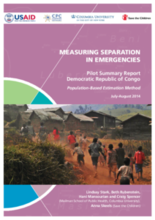The Measuring Separation in Emergencies (MSiE) project, funded by the USAID Office of Foreign Disaster Assistance, and implemented by Save the Children and Columbia University in association with other key academic partners including Johns Hopkins University, aims to strengthen emergency response programming for unaccompanied and separated children through the development of practical, field-tested tools to enhance the assessment of the scale and nature of separation in emergencies. Phase I included piloting a population-based estimation tool and community-based surveillance system in North Kivu, the Democratic Republic of Congo in 2014.
The MSiE project is steered by members of the Inter Agency Working Group on Unaccompanied and Separated Children and the Assessment and Measurement Task Force of the Global Child Protection Working Group who form a project-specific Advisory Panel.
This document reports on the field testing of the population-based estimation method (or ‘estimation method’) in North Kivu in the Democratic Republic of Congo (DRC). The estimation method was used to estimate the scale and basic characteristics of separation resulting from the armed group M23’s takeover of Goma in December 2012, also affecting the neighbouring territory of Nyiragongo. The pilot ran from July to August 2014.

